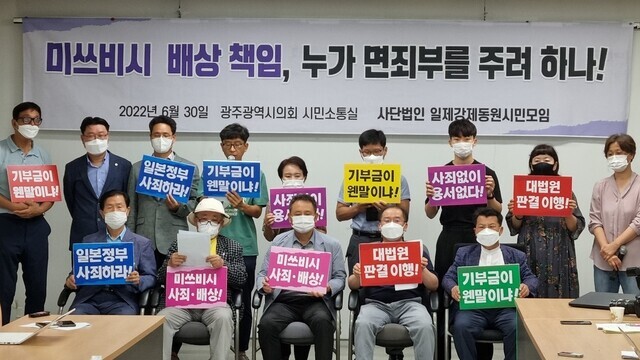hankyoreh
Links to other country sites 다른 나라 사이트 링크
Group for victims of forced labor by Japan decries roundabout plan for reparations

A support group for Korean victims of forced labor during the Japanese colonial period is taking a stand against “compensation by subrogation,” which the South Korean government has been discussing as a potential solution to the issue of compensation for these victims.
The Citizens’ Group Against Forced Labor During the Japanese Colonial Period held a press conference at the Gwangju City Council building on Thursday, where they stressed, “Victims of forced labor during the Japanese colonial period are ‘victims’ of human rights violations, not ‘disadvantaged individuals’ looking for a handout of goodwill from others.”
“Currently, Mitsubishi Heavy Industries is facing repossession of two trademarks and two patents and is on the verge of forced sales,” the group stated. “We cannot understand why our government is behaving so urgently and impatiently when the Japanese corporation that perpetrated [forced labor] is facing liquidation.”
The group went on, “The South Korea-Japan policy consultative group [led by National Assembly Deputy Speaker Chung Jin-suk], which visited Japan in April, discussed with Japan the establishment of ‘a public-private consultative body for the resolution of the issue of compensation for victims of forced labor,’ the ‘compensation by subrogation’ method, and the creation of a 30-billion-won fund.”
“It’s worrying that these measures are being unilaterally discussed without consultation with the victims when the word is that the Japanese companies that perpetrated [forced labor] may not be participating in the creation of the fund,” the group added.
The group expressly stated its opposition to “compensation by subrogation,” a method of restitution through which the South Korean government would compensate victims of forced labor in the stead of Japanese companies and later request indemnity from Japan.
The group stated, “Compensation by subrogation is a method through which a party that’s not accountable pays victims through fundraising or its own contribution in [the perpetrator’s] stead rather than [the perpetrator] fulfilling its obligation for compensation according to a verdict.”
“Our government should clarify why victims of forced labor during the Japanese colonial period should receive ‘donations’ from people without any relation [to the issue] instead of just ‘compensation’ from their perpetrators,” they stated.
“The victims have consistently demanded companies that committed war crimes to acknowledge historical facts and apologize as their principle of problem resolution. [. . .] Compensation by subrogation will not only absolve perpetrator companies of responsibility but also trample on what pride remains within victims who have fought for all their lives,” the group concluded.
In 2012, five Korean victims of forced labor during the Japanese colonial era residing in Gwangju and South Jeolla Province at the time, filed a lawsuit at a South Korean court demanding compensation for their forced labor. Of these complainants, 93-year-old Yang Geum-deok and 92-year-old Kim Seong-ju are the only two still alive. In November 2018, the Supreme Court of Korea ruled that complainants should receive compensation of 100 to 150 million won each, or roughly US$77,000 to US$115,000.
However, Mitsubishi Heavy Industries, the defendant in the case, did not take measures to compensate the victims, after which the plaintiffs filed for a repossession order for two trademarks and six patents Mitsubishi held in South Korea, which was subsequently granted.
Meanwhile, in order to resolve the issue of compensation for Korean victims of forced labor during the Japanese colonial period, the South Korean Ministry of Foreign Affairs will be forming a public-private consultative body presided over by the ministry’s vice minister and composed of scholars as well as experts. The body is set to start its activities on Monday.
By Kim Yong-hee, Gwangju correspondent
Please direct questions or comments to [english@hani.co.kr]

Editorial・opinion
![[Editorial] Japan’s rewriting of history with Korea has gone too far [Editorial] Japan’s rewriting of history with Korea has gone too far](https://flexible.img.hani.co.kr/flexible/normal/500/300/imgdb/original/2024/0422/1717137715201877.jpg) [Editorial] Japan’s rewriting of history with Korea has gone too far
[Editorial] Japan’s rewriting of history with Korea has gone too far![[Column] The president’s questionable capacity for dialogue [Column] The president’s questionable capacity for dialogue](https://flexible.img.hani.co.kr/flexible/normal/500/300/imgdb/original/2024/0422/1517137717613239.jpg) [Column] The president’s questionable capacity for dialogue
[Column] The president’s questionable capacity for dialogue- [Column] Are chaebol firms just pizza pies for families to divvy up as they please?
- [Column] Has Korea, too, crossed the Rubicon on China?
- [Correspondent’s column] In Japan’s alliance with US, echoes of its past alliances with UK
- [Editorial] Does Yoon think the Korean public is wrong?
- [Editorial] As it bolsters its alliance with US, Japan must be accountable for past
- [Guest essay] Amending the Constitution is Yoon’s key to leaving office in public’s good graces
- [Editorial] 10 years on, lessons of Sewol tragedy must never be forgotten
- [Column] A death blow to Korea’s prosecutor politics
Most viewed articles
- 1Samsung barricades office as unionized workers strike for better conditions
- 2[Editorial] Japan’s rewriting of history with Korea has gone too far
- 3[Column] The president’s questionable capacity for dialogue
- 4Korean government’s compromise plan for medical reform swiftly rejected by doctors
- 5[Reporter’s notebook] Did playing favorites with US, Japan fail to earn Yoon a G7 summit invite?
- 6[Column] The clock is ticking for Korea’s first lady
- 7[Column] Are chaebol firms just pizza pies for families to divvy up as they please?
- 8What Israel’s ‘warning shot’ response to Iran means for Middle East tensions
- 9[Column] Has Korea, too, crossed the Rubicon on China?
- 10Korea protests Japanese PM’s offering at war-linked Yasukuni Shrine